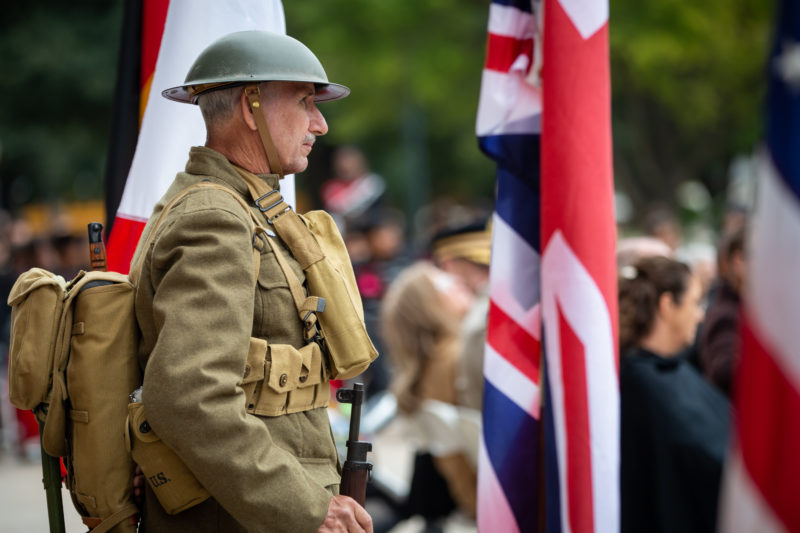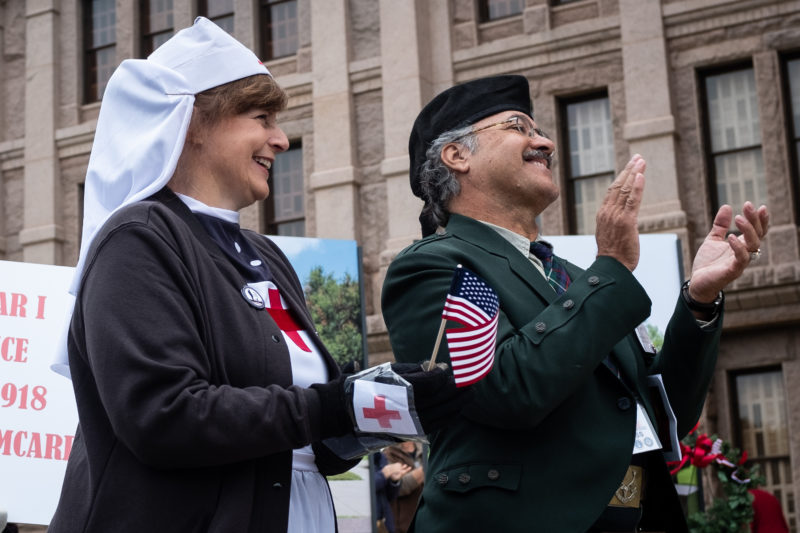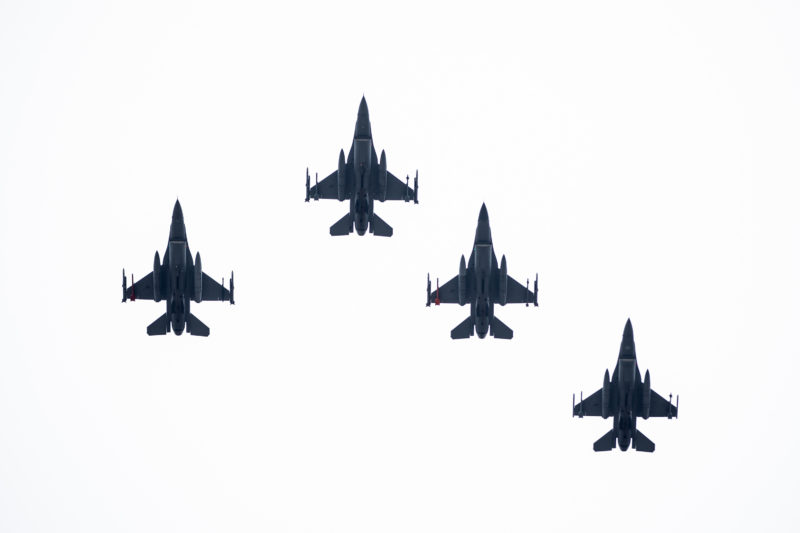A Century After the End of WWI, Texans Commemorate Veterans
By Michael Minasi
Reporting Texas

Army veteran Barry Faltesek, dressed as a World War I soldier, stands by during the Austin Veterans Day Parade Ceremony on Sunday, Nov. 11, 2018, in downtown Austin. Michael Minasi/Reporting Texas.
On September 15, 1918, David Hayden, a square-jawed 21-year-old from the tiny Central Texas farm-and-ranch town of Florence, found himself taking heavy fire in a field on the outskirts of Thiaucourt, France. When a fusillade of bullets ripped through a U.S. Marine, Hayden, a Navy Hospital Corpsman, sprinted to the Marine’s side, dressed his wounds and carried him to safety.
For his gallantry, Hayden was awarded the Medal of Honor — the country’s most prestigious military decoration. He was one of only four Texans to be honored with the award for their service during World War I.
A little more than a century after Hayden’s brave act, and exactly 100 years after the end of WWI, hundreds of people gathered on the south steps of the Texas Capitol to remember the nation’s military veterans at the end of the annual Austin Veterans Day Parade.
“At 11 o’clock this morning, church bells across the country are going to ring, and we will have a flyover of military aircraft here,” said Fox 7 Austin television news anchor Mike Warren, the parade’s master of ceremonies. “That is to remember and honor the anniversary of the signing of the armistice that ended World War I, 100 years ago today.”
On the eleventh hour of the eleventh day of the eleventh month of 1918, the guns of WWI fell silent when a ceasefire between the Allied Powers and Germany took effect. Nov. 11 was celebrated in the U.S. as Armistice Day from the end of the war until 1954 when President Dwight Eisenhower changed the name of the holiday to Veterans Day.
In Austin, Karen Bell, a British Consul General posted in Houston, laid a wreath at the WWI Monument on the Capitol grounds during the ceremony.
“It’s the day where across the United Kingdom, we too shall be having a minute of silence, wreaths will be laid, and we will all think about the peace and freedom which those that came before us are responsible for,” Bell said.
Ben Wright, assistant director for communications at the University of Texas at Austin’s Briscoe Center for American History, mused on the status of WWI during a presentation for Travis County History Day on Nov. 2.
“Since I’ve moved to Austin, I’ve been here about 15 years now, I’ve always been interested in the lack of WWI commemoration. The lack of the visible symbols and the tales and rituals,” Wright said. “WWI ends up kind of lost in the middle somewhere, not quite as ancient and sacred as the Civil War, and yet not quite as near and raw as World War II or Vietnam.”

Terri Marla, left, and Kevin McKenzie, right, both of the Travis County WWI Centennial Committee, applaud during the Austin Veterans Day Parade Ceremony on Sunday, Nov. 11, 2018, in downtown Austin. Michael Minasi/Reporting Texas.
Yet Texas made a huge contribution to the effort to win WWI, and some Texans were worried the state could even be invaded from Mexico.
In January 1917, as politicians in the U.S. were considering joining the conflict, British intelligence officers intercepted a telegram sent from German diplomat Arthur Zimmermann to the German ambassador to Mexico. Germany proposed helping Mexico reclaim lost territories in the Southwestern U.S., including Texas, if Mexico joined Germany in a military alliance against the U.S. The leaked telegram helped galvanize Americans’ support for joining the war effort.
But even before the Zimmermann Telegram, American troops were already building along the U.S.-Mexico border and tensions were running high. The Mexican Revolution ramped up in 1910, and U.S. Army troops chased the revolutionary Pancho Villa into Mexico in 1916. When war was declared against Germany, more than a dozen training camps sprang up across the state and about 198,000 Texans enlisted in the service during the war.
At least 5,000 Texans died during WWI, with more than a third of them dying in the U.S.from an influenza epidemic. In 1923, At the University of Texas, one of the largest war memorials in the nation was built to honor the Texans who died in the war — War Memorial Stadium, now christened Darrell K Royal-Texas Memorial Stadium — a 13-acre memorial funded by a student-led capital campaign.

F-16 fighter jets perform a flyover at the Texas State Capitol as bells toll across the nation during the Austin Veterans Day Parade Ceremony on Sunday, Nov. 11, 2018, in downtown Austin. Michael Minasi/Reporting Texas.
Austin resident Cecilia Mesick attended the Austin Veterans Parade and subsequent ceremony. She held a large poster bearing her great-uncle’s portrait and name: Army Pvt. Peter Paul McArdle, killed in action on April 14, 1918, in France.
“I think it has been forgotten over the generations, and I hope by being out there today and doing this, it’s just a reminder that there were real people and real families that suffered,” Mesick said.